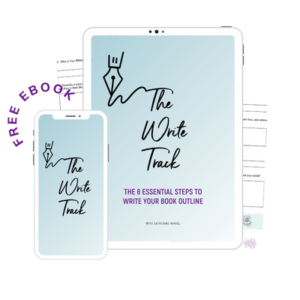Starting Your Writing Journey
Every aspiring writer embarks on their writing career with a unique book idea they wish to bring to life. The daunting question, however, is how to start and finish the actual writing of that book. Writing a book involves a complex writing process that may seem intimidating initially, but it becomes achievable with the right strategies.
If you are eager to start writing books but need help figuring out where to begin, this guide is for you.
Here, we will take you through a step-by-step process to help with book writing, offering you insights into the writing habits of successful writers and providing practical tips to navigate the writing process.
Ignite the Spark: Crafting Your Book Idea
Every book project begins with a compelling idea. This idea, your particular story, should be something you’re passionate about, something that stimulates your imagination. Your passion for your story will carry you through the inevitable challenges of the writing process.
Don’t worry if your book idea seems unclear at first. Writing a book involves refining and revising your ideas like any other creative process. Let the idea germinate in your mind. Discuss it with fellow writers. Write down your thoughts in a dedicated writing space. It’s all part of the process.
Overcoming the Hurdle: Dealing with Writer’s Block
Writer’s block is a common obstacle for writers, especially when you start writing. Even seasoned writers like Stephen King experience this state of being stuck, unable to progress with their writing.
Most writers, if not all, have encountered writer’s block at some point in their writing career. It’s that frustrating period where no matter how much you want to write a book, the words don’t appear.
Firstly, know that this is a common phenomenon and doesn’t signify the end of your writing journey. Consider taking a break. Often, our best ideas come when we’re not actively thinking about them. Go for a walk, read a book, or do something you enjoy.
Another strategy is to change your environment. If you’ve been writing at home, try going to a coffee shop or a library. Sometimes, being in a different location can stimulate your brain and spark new ideas.
One effective way to tackle writer’s block is through writing exercises. These exercises stimulate your brain, sparking fresh ideas and easing you into the writing session. Another method is to change your environment. Move your writing space to a different room, or try writing sessions in a coffee shop. New surroundings can provide a fresh perspective and renew your inspiration.
The Writing Process: First Draft to Final Manuscript
The first draft is where you begin writing your book in earnest. Stephen King famously stated, “The first draft is just you telling yourself the story.” This step in the book-writing process involves getting your story down on paper. Don’t worry about perfection; your goal here is forward progress. You want to keep your creative momentum going.
Establishing a consistent writing schedule is a valuable habit in maintaining that momentum. Set a daily word count goal to keep yourself accountable. Remember, a book is written one word at a time, and every word you write is one step closer to your finished book.
By the end of this phase, you will have completed your entire book’s first draft. It’s a significant accomplishment that marks the transition from the initial, actual writing phase to the editing process.
Polishing Your Manuscript: The Editing Process
So you’ve finished your first draft? Congratulations! Now, it’s time to move into the editing process. This part of the book writing process is where your rough manuscript becomes a polished book. It may seem overwhelming initially, but every successful writer has undergone this crucial phase.
The Power of Revision
The initial focus of your editing process should be on the content. You examine your story’s structure, pace, and consistency here. Is the narrative compelling enough to keep a reader’s interest? Are the characters well-developed and relatable? You need to be a tough critic in this stage, ruthlessly cutting out anything that doesn’t serve your story.
Line Editing and Proofreading
Once you’re satisfied with your manuscript’s overall structure and content, it’s time for line editing. This is where you scrutinize each line, refining your writing style and voice. Look for awkward sentences, redundancies, and unclear phrasing.
The final stage is proofreading, where you check for grammar, spelling, and punctuation errors. Many writers find it beneficial to hire a professional editor for this stage. An editor brings a fresh, experienced eye to your work, catching mistakes you may have missed.
Leveraging Book Writing Software
In this digital age, there are numerous tools available to aid writers. Book writing software can be helpful, especially for first-time or nonfiction writers. These tools provide features like grammar and spell checks, suggestions for improving sentence structure, and plot development tools for fiction and nonfiction writers.
Some popular book writing software includes Scrivener, which offers a comprehensive solution for manuscript organization and formatting, and Grammarly (my favourite), which helps polish your writing by identifying grammar errors and suggesting improvements.
However, remember that these tools are there to aid you rather than to do the work for you. They can’t replace your creativity, unique writing style, or passion for the story you’re telling.
Your book-writing process will be filled with challenges and triumphs. Remember to stay dedicated, be patient, and keep your ultimate goal in mind: seeing your very own book in print. You have a unique story to tell, so write a book about it!
Overcoming Self-Doubt and Maintaining Motivation
Even with a finished first draft and a clear editing plan, self-doubt can be a persistent barrier for many writers. Questioning your writing ability is normal, but don’t let this stop you. Remember, even the most successful writers have faced self-doubt.
Building a Supportive Writing Community
Connecting with other writers can be a powerful way to overcome self-doubt. You’re not alone in this journey. Seek out writers’ groups in your local community or online. Share your work in progress with them and be open to their feedback.
Staying Motivated
Maintaining motivation can be challenging, especially if you’re working on a full-length book that may take over a year to write. Setting small, achievable writing goals can help keep your motivation high. Celebrate each milestone, whether it’s finishing a chapter, hitting a word count target, or completing your first draft.
Embracing the Writer’s Lifestyle
Honing Your Writing Habits
One of the most crucial aspects of successful book writing is establishing and maintaining good writing habits. When you create a writing routine and stick to it, the daunting task of writing an entire book becomes much more manageable.
First, identify your most productive times of the day. Some writers find their creative juices flowing early in the morning, while others prefer the silence of the night. Try out different times to find out when you’re most efficient and focused.
Next, create a dedicated writing space. This doesn’t have to be a particular room or office; it could be as simple as a spot in your living room, a corner in your bedroom, or even a coffee shop where you feel comfortable. What’s important is that the environment stimulates your creativity and reduces distractions.
Setting a daily word count goal can be beneficial too. This gives you a target to aim for each day and helps you make consistent progress. Whether it’s 500 or 2000 words a day, consistency matters most.
Embracing the Writer’s Journey
Finally, embrace your journey as a writer. It’s not always going to be easy. There will be days of self-doubt, writer’s block, and criticism. But there will also be moments of triumph, breakthrough, and joy.
Joining a community of fellow writers can provide you with the support and camaraderie you need during challenging times. And remember, every writer, no matter how successful, started where you are now. They also faced rejection, self-doubt, and criticism but kept going.
Writing a book is a labour of love. It is the writer’s job, a journey of self-discovery and personal growth. So, keep writing, keep learning, and, most importantly, enjoy the process.
You can navigate the book writing process by following these steps, maintaining consistency, and applying these principles. It sounds obvious and daunting, but you can undoubtedly pen a book you’re proud of with dedication, patience, and persistence.
Adopting the lifestyle of a professional writer involves more than just perfecting your writing process. It’s about integrating writing into your everyday life. Here are some ways to immerse yourself in the writing life and further your writing career.
Embracing Your Unique Writing Style
Every writer’s unique writing style sets their work apart from others. This individuality helps create a distinct voice and connect with readers on a deeper level. However, developing and recognizing your writing style is often a journey.
As you embark on your book-writing process, be conscious of your style. Are you a detailed-oriented writer who enjoys painting vivid pictures with your words? Or do you have a more direct, to-the-point approach? Perhaps your strength lies in your dialogue, character development, or plot twists. It might be challenging to identify your style initially, but the more you write, the more pronounced it will become.
Consider reading books that resonate with your desired style. Analyzing the works of others can provide insight into what works and what doesn’t, giving you valuable ideas to incorporate into your writing. Stephen King, a successful writer known for his unique style of fiction writing, once said, “If you write fiction and you don’t have the time to read, you don’t have the time (or the tools) to ever write fiction.”
Furthermore, remember that your writing style should suit your book’s genre and target audience. For instance, a formal and professional tone might be more appropriate for writing a business book. Conversely, a more imaginative and creative style may be beneficial if you write children’s or fiction books.
Invest in Quality Writing Tools
Good writing software can make your writing process smoother. Tools like Scrivener offer features specifically designed for book writing, such as outlining, scene organization, and word count trackers. A quality writing app can be a game-changer, especially if you prefer writing on the go.
Participate in Writing Communities
Joining writing communities can provide the support and encouragement you need, especially when dealing with writer’s block or self-doubt. Online platforms like NaNoWriMo, WritersCafe, or Storytellers Cafe offer opportunities to connect with fellow writers, share your work, and receive constructive criticism.
Practical Writing Tips
In addition to understanding the broader aspects of book writing, several practical writing tips can enhance your writing style and make your book more engaging.
Show, Don’t Tell
This is a golden rule in writing fiction (and instances of nonfiction). Instead of telling your readers what’s happening or what a character is feeling, show it through actions, dialogue, and sensory details. This technique immerses your readers in the story and makes the narrative more compelling.
Use Active Voice
Writing in the active voice creates a stronger, more direct sentence structure. It makes your writing clearer and more engaging, keeping your readers hooked.
Vary Sentence Structure
Using a variety of sentence lengths and structures can make your writing more dynamic and interesting. Don’t be afraid to mix simple, compound, and complex sentences to keep your reader’s interest.
Inspiration and Perseverance
Finally, remember that inspiration can strike at any time. Be open to fresh ideas, carry a notebook, or use a note-taking app to jot down thoughts as they come. Don’t dismiss any idea, no matter how insignificant it might seem. Often, the smallest ideas grow into the most engaging stories.
The act of writing a book is a journey filled with ups and downs. There will be days when the words flow freely and days when you struggle to write a single sentence. The key is to persevere. Remember, every writer, from Stephen King to J.K. Rowling, faced rejection and doubt, but they never gave up.
As you continue with your writing journey, remember to enjoy the process. Embrace the challenges, celebrate the small victories, and keep writing. After all, the world is waiting for your story.
Now, let’s move on to the Frequently Asked Questions (FAQs) section, where we answer some common queries about book writing.
Navigating the Publishing Landscape
After the hard work of writing and revising your book, it’s time to share it with the world. Whether you choose traditional publishing or self-publishing depends on your personal preferences, book genre, and career goals.
Traditional publishing involves submitting your book to publishing houses or literary agents, who will then take care of the editing, book cover design, distribution, and marketing. Stephen King, for instance, is one of the many fiction writers who succeeded through this route. This path requires patience and perseverance, as finding a publisher willing to take a chance on your book might take time.
On the other hand, self-publishing offers more control over the entire process. You’re responsible for editing, book writing, cover design, marketing, and distribution. But you also get to keep all the profits from book sales. It’s a popular choice among both fiction writers and nonfiction writers.
Remember to do thorough market research regardless of your publishing path. Understand your target audience and their reading preferences. Align your book cover, title, and blurb to attract the right readers. Also, consider professional services for book cover design and formatting, especially if you’re self-publishing.
Self-publishing or Traditional Publishing?
After you’ve put in all the effort of writing, editing, and revising, the next question on your mind might be: “Should I self-publish or seek traditional publishing?” This significant decision will shape the rest of your book’s journey. Both self-publishing and traditional publishing have their own set of advantages and disadvantages.
If you self-publish, you have complete control over your entire book — from the cover design and the book writing process to the marketing strategy. With online platforms for self-publishing, it has never been easier to publish your own book. Plus, you get to keep a larger percentage of the royalties. However, you’ll also have to manage the entire process, including tasks outside your area of expertise, like book cover design, market research, and promotion.
Traditional publishing, on the other hand, can offer a sense of prestige and the benefit of a professional team. With traditional publishing, a publishing house takes care of your book’s editing process, cover design, marketing, and distribution. However, breaking into traditional publishing can be difficult and often requires a literary agent. Plus, the royalties are typically lower than with self-publishing.
Therefore, the choice between self-publishing and traditional publishing ultimately depends on your personal preferences, skills, and career goals as a writer.
Exploring the World of Self-Publishing
In today’s digital age, self-publishing is a viable alternative to traditional publishing. It offers a faster route to get your book into the hands of readers and allows you to maintain complete control over the creative process, from cover design to pricing.
Numerous self-publishing platforms are available, including Amazon Kindle Direct Publishing (KDP), Ingram Spark, Smashwords, and Lulu. These platforms offer comprehensive guides to assist you in self-publishing, including formatting your book, designing your cover, and setting your price.
However, self-publishing also means you’re responsible for marketing and promoting your book. Conducting market research, identifying your target audience, and developing a promotional strategy ensures your book reaches its intended readership.
I am a huge advocate for self-publishing so please know that although there will be boot strapping involved there are MANY people out there to support you with this process too. You don’t have to go at it alone.
Making Your Book Cover Stand Out
Despite the old saying, many people do judge books by their covers. A compelling book cover can significantly influence a potential reader’s decision to pick up your book or pass it by. Therefore, investing time and resources into designing an enticing cover is crucial.
If you’re artistically inclined, you may choose to design your cover. There are various software and applications, including Adobe Photoshop and Canva, that can assist in creating an attractive cover. However, if you’re not comfortable with design, consider hiring a professional. There are numerous freelancers and agencies specializing in book cover design that can help bring your vision to life. I am happy to introduce you to the brand responsible for my best-selling guided Journal, Lightbulb Moments.
The Importance of Market Research
Knowing your market is a key aspect of successful book writing and publishing. Understanding your potential readers, what they like, and where they spend their time can significantly influence your writing and marketing decisions.
Market research can involve:
- Reading books in the same genre.
- Studying book reviews.
- Engaging with readers on social media.
- Conducting surveys.
The more you understand your target audience, the better you can tailor your book and promotional activities to meet their interests and needs.
Building Your Author Brand
Building an author brand is more than just promoting your bestselling book; it’s about promoting yourself. Readers are often as interested in the author as they are in the book. Therefore, having a strong author brand can significantly impact your bestselling book’s success.
Your author brand might involve:
- A professional author website.
- An active social media presence.
- Regular blog writing.
- A newsletter.
Engage with your audience, share updates few tips about your writing process, give them insights into your life as a professional writer yourself, and cultivate a community of loyal readers who anticipate your next book.
Nurturing a Supportive Writing Community
As you move forward in your writing career, one of the most valuable resources can be other writers. Fellow writers understand the struggles and triumphs of the writing process like no one else. Engaging with a community of writers can provide feedback, encouragement, and fresh ideas. You might join a local writing group, participate in online writing forums, or attend writers’ conferences and workshops.
Seasoned writers can offer valuable insights and advice while aspiring writers can bring a sense of enthusiasm and a fresh perspective to begin writing with. You can find a writing coach or mentor who can provide personalized guidance and support. Building a supportive writing community can make the book writing process more enjoyable and rewarding and contribute significantly to your writing growth and success.
Remember, every successful writer started writing their first book at some point. It might seem daunting at first, but with dedication, persistence, and the right strategies, you can start writing your own book today. Don’t let self-doubt stop you from telling your own stories and sharing them with the world.
As Stephen King famously said, “The scariest moment is always just before you start.” So take a deep breath, pick up your pen, open your writing app, and begin writing. You’re making progress with each word, sentence, and page. You’re bringing your book to life. And who knows? Your book might be the next bestseller.
The Power of Routine and Discipline in Book Writing
As a writer, it’s crucial to understand the importance of discipline and routine in the writing process. The idea of waiting for inspiration to strike is a myth. Most successful writers adhere to a writing schedule and make it a daily routine. This might involve setting aside specific times for writing sessions each day or establishing a daily word count goal.
Perhaps you’re a morning person, and your brain is most active just after sunrise. Or maybe you’re a night owl and your creativity peaks when the world is quiet. Identify your productive times and set those hours aside for your book-writing process. It’s also beneficial to have a dedicated writing space — your home office, a coffee shop, or a library. This consistency signals your brain that it’s time to get into the writing zone.
The writing might sometimes seem tough, especially when encountering the dreaded writer’s block. Don’t worry; even the best and most seasoned writers experience it. The key is not to stop writing. Write through it. Not all writing sessions will be equally productive, but it’s essential to keep moving forward. Remember, you can’t edit a blank page.
The Revision Process: Refining and Polishing Your Work
Once you have completed the first draft of your book, give yourself a pat on the back, dance a little, and cheer yourself — celebrate this! It’s a significant achievement. However, remember that the first draft is just the beginning. The writing process involves multiple revisions to shape your rough diamond into a polished gem.
The first few pages of your book are particularly important. They’re your chance to capture the reader’s interest. So, spend extra time refining these pages. Make sure they’re engaging, compelling, and a true reflection of what’s to follow.
Work on the entire book, section by section, revising for clarity, coherence, and conciseness. Ensure the narrative flows smoothly. Check for consistency in your writing style and tone. Polish your dialogues, descriptions, and transitions.
It’s also essential to take a step back from your work-in-progress for a while. You can view it with fresh eyes and a new perspective when you return. You might notice things you overlooked before — perhaps a gap in the plot or a character that needs more development.
Finally, consider hiring a professional editor. An experienced editor can provide invaluable feedback and help you improve your book. They can spot grammatical errors, punctuation mistakes, inconsistencies, and awkward sentences you might have missed. I always say this should be non-negotiable. You didn’t put all this time into writing your book for it not to be perfect.
Celebrating Each Milestone
Every step in the book writing process is a milestone — from fleshing out your book idea to starting the first chapter, reaching your target word count, finishing the first draft, and ultimately publishing your book. It’s important to celebrate each accomplishment. It’s a journey, and every step forward is a victory.
Remember, writing fiction or nonfiction into a book is a marathon, not a sprint. Don’t rush the process. The goal of writing fiction now isn’t just to write a book; it’s to write a high-quality book that you’re proud of and that readers will enjoy. So, take your time. Enjoy the creative process. Be patient with yourself and your work.
Writing a book might be one of the most challenging things you’ll ever do, but it’s also one of the most rewarding. So, keep writing. Keep improving. Keep dreaming. Your words have power, and your story matters.
Engaging with Fellow Writers and Readers
Building a supportive network can enrich your writing life and career. Fellow writers can offer valuable advice, feedback, and empathy like no one else. They understand the joys and struggles of the writing process because they’ve been there.
Join local writers’ groups or online communities. Attend writers’ conferences and workshops. Connect with writers and readers on social media platforms. Share your writing journey, your book idea, and your progress. Not only will you learn from other writers, but you can also establish a readership base even before your first book ever is published.
Engage with your readers. Understand their expectations, their likes, and dislikes. Keep them interested and excited about your upcoming book. Your readers are your biggest supporters and your toughest critics. Their feedback can provide fresh ideas and insights to improve your first book.
Learning and Growing as a Writer
Writing a book is a significant achievement but also a tremendous learning experience. With each book you write, you grow and evolve as a writer. You learn more about your writing style, strengths and weaknesses, and the stories you want to tell.
Read widely and regularly. Reading improves your writing skills and keeps you informed about trends and conventions in your genre. Study how successful fiction writers often craft their sentences, develop their characters, and build their plots.
Also, invest time in learning the craft. Attend writing workshops, take writing courses, or hire a writing coach. Practice writing regularly. It could be writing short stories, blog posts, or even daily journal entries. The goal is to write consistently and consciously work on improving your skills.
Remember, every writer, including the bestselling authors, started from scratch. They faced self-doubt, received rejections, and stumbled along the way. But they kept writing, kept learning, and never gave up. And that’s what makes them successful writers.
Creating Your Writing Space
Having a dedicated writing space is essential for productivity and maintaining a steady writing routine. This space could be anywhere in your home – a particular room, a quiet corner, or even a coffee shop. What matters is that this space allows you to focus, inspiring creativity and fostering your writing life.
Consider factors like lighting, comfort, and noise when setting up your writing space. Make it a haven, somewhere you look forward to spending time. Keep your writing tools – laptop, notepads, pens, reference books – easily accessible. This will help ensure you’re ready to capture your ideas when inspiration strikes.
Using Technology to Your Advantage
There’s a wealth of book writing software and writing apps out there designed to make the writing process smoother. From word processing tools like Microsoft Word and Google Docs to specialized book writing software like Scrivener, these tools offer features to help you plan, write, and format your book.
Grammar-checking tools like Grammarly can help you catch errors and polish your writing, while distraction-free writing apps can help you maintain focus during writing sessions.
Conclusion
Writing a book is a unique journey. It’s filled with moments of joy, despair, self-doubt, and triumph. It requires creativity, discipline, patience, and resilience. It involves not only writing a compelling narrative but also effectively revising it, understanding the publishing industry, connecting with fellow writers and readers, and continuously learning and improving as a writer.
In the end, seeing your book in the hands of a reader and knowing that your words can entertain, inspire, or educate them makes the entire process of writing books seem worthwhile. It’s a journey worth taking, a story worth telling. So, keep writing.
Frequently Asked Questions
Q: How long does it take to write a book?
A: The time it takes to write a book depends on several factors, including the book’s length, your writing speed, and how much time you can dedicate to writing each day. On average, a full-length book might take anywhere from a few months to a year or more to complete.
In my Master Your Manuscript one-on-one program, clients complete their manuscripts in an average of 120 days. This program is designed with the writer in mind, setting realistic timelines, expert critique and feedback, and a cheerleader and confidante along the way.
Q: How do I deal with writer’s block?
A: Writer’s block can be a hurdle for many writers. To overcome it, try changing your environment, taking a break to do something you enjoy, or switching to another project. It can also be helpful to outline your ideas before you start writing to avoid getting stuck.
Q: Should I self-publish or seek traditional publishing?
A: Both self-publishing and traditional publishing have their pros and cons. Self-publishing offers more control over your work and higher royalties, but it also means you’re responsible for editing, cover design, and marketing. Traditional publishing provides professional editing and marketing resources, but it can be difficult to get a publishing deal, and royalties are typically lower.
Q: What are some effective strategies for improving my writing?
A: Reading widely and practicing regularly are two of the most effective ways to improve your writing. Consider joining a writers’ group for feedback, taking writing courses, or hiring a writing coach. Remember that improvement takes time and persistence.
Q: How many words should my book be?
A: The word count for a book can vary greatly depending on the genre and audience. For example, many adult novels are around 60,000 to 100,000 words, while children’s books are significantly shorter. However, the most important thing is to tell your story effectively, regardless of word count.
Let me know how I can help
Catherine x

Email: catherine@catherinenikkel.com
Resources
What type of Content Creator are you? Take the Quiz! – 4 different types of creators, which one are you?
Need help telling your story in your own voice? Let’s make it happen. Schedule a consultation with me here





